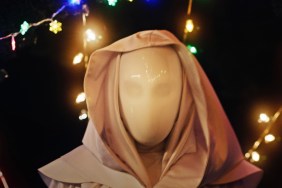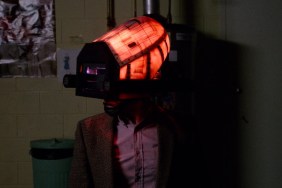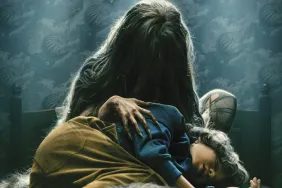
My experience with Japanese director Kaneto Shindo was zero before pushing play on Criterion’s new Blu-ray presentation of the helmer’s 1968 supernatural horror Kuroneko. I was familiar with Shindo only in that I’d heard of his ’64 feature, Onibaba, and after reading the synopsis for that film it would seem Kuroneko is something of an even darker version of the helmer’s film from four years earlier.
Set in war-torn medieval Japan, Kuroneko centers on a mother and her daughter-in-law who are raped and murdered by itinerant samurais. Upon their death they make a deal with the devil to remain on Earth as spirits, luring samurai into their clutches and killing them to make up for the lives they’ve stolen.
The story takes an interesting turn when the son returns home after being forced to join the war. Now a samurai in his own right, he comes back only to find his home burned to the ground and no word of his wife and mother, but stories of a spirit in the bamboo forest. When called upon to dispatch these spirits only then does he learn the truth…
Seeing how this was my first time with a Shindo film I didn’t have anything to draw from for comparison to his previous work, though the film itself did conjure comparisons to Akira Kurosawa’s Throne of Blood and I would swear the bamboo forest where most of the action takes place looks almost exactly the same as the scenes from Masaki Kobayashi’s Harakiri. I did a quick search to see if that was true, but to no avail. As for modern day films, small comparisons to House of Flying Daggers is quite easy to make and I’d even say this qualifies as early, art house J-horror, though Shindo is certainly more concerned with atmosphere than jump scares as is the case with modern day horror films.
Maitland McDonagh finds a similar connection in her included essay “Kuroneko: The Mark of the Cat” saying, “Scratch the surface of a contemporary J-horror classic like Ringu (1998) or any of the Ju-on films (2000–03) and you’ll glimpse Yabu no naka no kuroneko (Black Cat from the Grove)” and she also goes on to recommend earlier stories exploring such territory including The Ghost of Yotsuya and Kwaidan as well as Ugetsu, only the latter of which have seen, but like Kuroneko, I wasn’t blown away the first time I saw it.
I was, however, in the hands of Shindo while watching. My eye wasn’t wandering and I was never distracted or felt an urge to look elsewhere or pause for a personal break. There is a mounting tension in the film, but I never felt it arrived at much of a climax or resolution. Perhaps I’ll find more in a second viewing.
As for this Blu-ray release, on top of the 28-page booklet which contains the McDonagh essay I already mentioned as well as an excerpt from film scholar Joan Mellen’s 1972 interview with Shindo you get two interviews, one an hour-long interview with Shindo from the Directors Guild of Japan and the other with film critic Tadao Sato.
The prize, however, is the transfer. This is a beautiful black-and-white presentation that doesn’t lose any of its atmospheric qualities due to a bad high definition transfer. Criterion’s Blu-ray is with few imperfections as the fog rolls between the bamboo and a shrouded woman in white leads unsuspecting samurai to their doom.
The setup is quite fantastic and every time I think about it I get a brief rush, which is why I wished I had enjoyed it more. It’s also why I want to give it a second spin and seek out Onibaba to get a an even greater understanding of Shindo’s work. There are so many filmmakers out there I’m still seeking and education on and with Kuroneko I learned of one more.
You can buy Kuroneko on Criterion [amazon asin=”B005D0RDPM” text=”DVD”] and [amazon asin=”B005D0RDRA” text=”Blu-ray”] at Amazon.com.
On a side note, if you’re interested in learning about the creation of the Criterion cover art check out this post by artist Sam Smyth on his official website.









